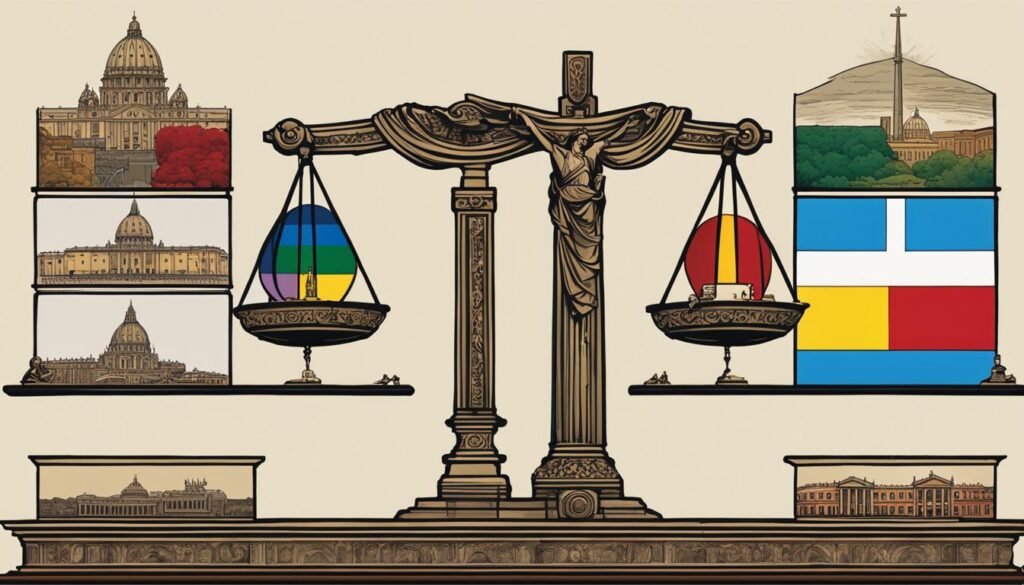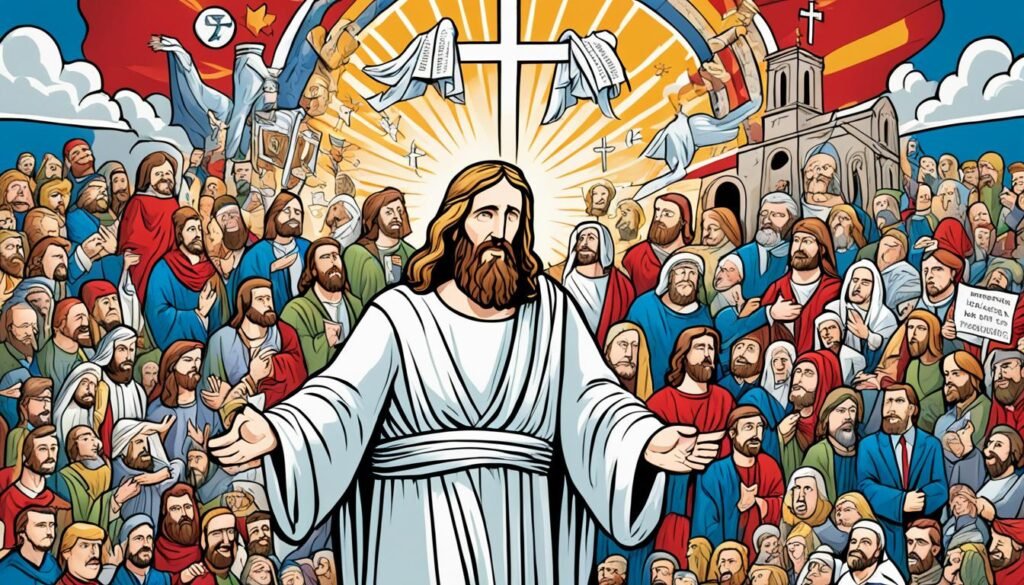The debate over the political ideology of Jesus has been a topic of discussion for centuries. Examining various sources, including religious texts and historical analysis, can shed light on this intriguing question.
Key Takeaways:
- Jesus’ political ideology has been a subject of historical debate for centuries.
- Understanding Jesus’ teachings requires examining religious texts and historical context.
- The Vatican’s perspective offers insights into the political stance associated with Jesus.
- Jesus’ teachings transcend modern liberal and conservative categories.
- Interpretations of Jesus’ ideology often align with personal political beliefs.
The Vatican’s Perspective
The Vatican, under the leadership of Pope Francis, holds a unique political stance that combines both liberal and conservative elements. While the Church remains steadfast in its commitment to conservative values, especially in regards to issues such as abortion and traditional family structures, Pope Francis has also expressed support for progressive causes and advocated for social justice.
One notable example of Pope Francis’ liberal stance is his support for LGBTQ+ rights. In 2019, he made headlines by stating that homosexual individuals should not be condemned, marking a significant departure from the Church’s historical position on homosexuality. This statement conveyed a message of inclusivity and acceptance, aligning with more liberal viewpoints on LGBTQ+ rights.
Furthermore, Pope Francis has been a vocal advocate for a more compassionate approach to migration. He has called on governments and individuals to welcome and support refugees and migrants, emphasizing the importance of showing empathy and understanding towards those seeking a better life. This position reflects a more liberal perspective on immigration and aligns with the Vatican’s commitment to social justice.
A person who thinks only about building walls… and not building bridges is not a Christian. This is not the Gospel.”
It is important to note that while the Vatican and Pope Francis have taken a more liberal stance on certain social and political issues, they continue to uphold conservative positions on others. For instance, the Church’s opposition to abortion remains unchanged, as it aligns with their belief in the sanctity of life. Similarly, the Vatican maintains its support for traditional family structures, emphasizing the importance of marriage between a man and a woman.
Overall, the Vatican’s perspective, as reflected by Pope Francis, is a nuanced blend of liberal and conservative values. This balanced approach allows the Church to address contemporary social and political issues while remaining rooted in its long-standing traditions and principles.

Jesus’ Teachings and Social Implications
Jesus’ 2,000-year-old teachings cannot be easily categorized as liberal or conservative. While his message is primarily religious, it does have political and social implications. His teachings emphasize love, mercy, and compassion for all individuals, regardless of their social or political standing.
Jesus’ teachings go beyond religious doctrines and extend into the realms of politics and society. His emphasis on love and compassion challenges societal norms and expectations, urging individuals to interact with one another in ways that promote harmony and understanding.
“Love your enemies and pray for those who persecute you.”
This radical teaching promotes forgiveness and reconciliation, showing that Jesus’ message has far-reaching implications for political and social relationships. His teachings provide a foundation for promoting justice, equality, and fairness in society.
Jesus’ call to care for the marginalized and oppressed has significant social implications as well. It challenges us to question the systems and structures that perpetuate inequality, urging us to advocate for justice and compassion in all areas of life.
“Whatever you did for one of the least of these brothers and sisters of mine, you did for me.
This teaching invites believers to address issues of poverty, discrimination, and other forms of social injustice. It emphasizes the importance of actively engaging in the pursuit of social equality and the alleviation of suffering.
Furthermore, Jesus’ teachings encourage believers to prioritize spiritual and moral values over material gain and power. This challenges the greed and corruption often associated with political systems and calls for a renewed focus on integrity, humility, and service.
“You cannot serve both God and money.”
By highlighting the interconnectedness of the religious, political, and social aspects of human life, Jesus’ teachings provide a framework for individuals to navigate their roles as citizens and believers. They inspire believers to actively participate in shaping a just and compassionate society.
Examples of Jesus’ Teachings and Their Social Implications
| Teaching | Social Implication |
|---|---|
| “Love your neighbor as yourself” | Promotes empathy, compassion, and respect for others |
| “Do unto others as you would have them do unto you” | Advocates for fairness, justice, and equality in interpersonal relationships |
| “Blessed are the peacemakers” | Encourages the pursuit of peace, reconciliation, and conflict resolution |
| “Feed the hungry, clothe the naked, care for the sick” | Emphasizes the importance of social responsibility and care for the vulnerable |
Jesus’ teachings transcend political labels and ideologies, challenging believers to align their actions with the principles of love, compassion, and justice. They inspire us to pursue societal transformation, seeking the well-being of all individuals and fostering a more inclusive and equitable world.
Jesus and the Political Categories of His Time
During Jesus’ time, the political landscape was vastly different from our modern understanding of political categories. It is important to recognize that the frameworks we use today, such as liberal and conservative, were developed during the French Revolution in the 18th century.
Applying these categories to Jesus’ teachings can oversimplify and distort their true meaning. Jesus’ message went beyond political ideologies of his time, focusing on spiritual and moral principles that transcended any specific political agenda. His teachings were centered around love, compassion, and justice for all.
The political turmoil of Jesus’ era was marked by the Roman occupation of Israel, the influence of various Jewish sects, and the power struggles among religious and political leaders. Jesus’ teachings challenged the existing social order and called for a radical transformation of hearts and minds.
“Do not think that I have come to bring peace to the earth. I have not come to bring peace, but a sword.” – Matthew 10:34
Jesus’ words in this passage were not advocating for violence or division, but rather emphasizing the transformative power of his message. He aimed to bring about a fundamental change in society by challenging oppressive systems and calling individuals to a higher moral standard.
Understanding the political context of Jesus’ time helps us appreciate the depth and significance of his teachings. Rather than being limited by political categories, Jesus’ message transcends boundaries and speaks to the universal human experience.
| Political Categories | Jesus’ Teachings |
|---|---|
| Liberal | Emphasized love, compassion, and justice for all individuals, regardless of their social or political standing. |
| Conservative | Called for adherence to traditional values and challenged oppressive systems. |
| Radical | Advocated for a fundamental transformation of hearts and minds, challenging societal norms. |
Jesus’ Impact on Modern Politics
In more recent times, Christianity has had a significant influence on modern politics, with its associations often leaning towards specific positions on the political spectrum. Various political parties in Europe, for example, have embraced Christianity as part of their identity politics, aligning themselves with the values and traditions associated with the religion.
Christianity’s impact on the political landscape cannot be understated. It plays a crucial role in shaping the ideologies and policies adopted by politicians and political parties. As an influential force, it has the ability to mobilize voters and shape public opinion on various issues.
Political parties that align themselves with Christianity often emphasize values such as traditional family structures, pro-life beliefs, and opposition to same-sex marriage. These positions often align with conservative ideologies and find support among conservative Christians. On the other hand, there are also progressive Christian groups that advocate for social justice, equality, and inclusivity. They focus on issues such as poverty, immigration, racial inequality, and climate change.
Despite the diverse interpretations of Christian teachings and their implications for modern politics, it is evident that Christianity plays a significant role in shaping the political discourse within society. It provides a moral and ethical framework for decision-making and influences the positions adopted by politicians and political parties.
“Christianity is not just a religion; it is also a powerful political force that has the ability to shape societies and influence policy decisions.”
– Political Analyst
While it is essential to recognize the impact of Christianity on modern politics, it is equally important to acknowledge that not all Christians align themselves with a particular political ideology. Christianity encompasses a diverse range of beliefs, and individuals within the faith community may hold differing political views. It is crucial to approach discussions on Christianity and politics with nuance and respect for the diversity of perspectives within the religion.
Key Takeaways
- Christianity has become associated with specific political positions and ideologies in modern politics.
- Political parties in Europe and elsewhere align themselves with Christianity as part of their identity politics.
- Christianity influences the beliefs, values, and policy positions of politicians and political parties.
- There are conservative and progressive interpretations of Christian teachings in the political sphere.
- Not all Christians align themselves with a particular political ideology, and diversity of perspectives exists within the faith community.
Christianity’s impact on modern politics is a complex and multifaceted phenomenon, shaped by historical, cultural, and religious factors. As society continues to evolve, the interplay between Christianity and politics will remain a topic of ongoing discussion and analysis.

Jesus’ Values and Political Issues
During his ministry, Jesus addressed a wide range of political issues, shedding light on the principles that transcend partisan divisions. His teachings emphasized the importance of generosity, compassion, and caring for the marginalized and oppressed. Jesus’ message calls for a society built on love and justice, rather than aligning with any particular political party.
“Truly I tell you, whatever you did for one of the least of these brothers and sisters of mine, you did for me.” —Matthew 25:40
Jesus showcased generosity by prioritizing the needs of the marginalized and oppressed. He challenged societal norms by emphasizing the equal value and worth of all individuals, regardless of their social or political standing. Jesus taught his followers to embrace compassion and extend helping hands to those in need, fostering a sense of solidarity and empathy within their communities.
Additionally, Jesus’ teachings called on his followers to stand up against injustice and promote fairness and equality. He challenged the powerful and confronted oppressive systems, advocating for the rights and dignity of every human being. By doing so, Jesus exemplified the intersection between spirituality and politics, emphasizing that holding political power necessitates using it to uplift and empower the marginalized.
To illustrate the depth of his teachings, let’s examine a few examples:
1. The Good Samaritan
The parable of the Good Samaritan exemplifies Jesus’ teachings on compassion and the obligation to help others. Through this story, Jesus emphasized that true generosity extends beyond societal boundaries, urging listeners to show compassion to those in need without prejudice or judgment.
2. Sermon on the Mount
In his Sermon on the Mount, Jesus expressed his views on various social and ethical issues, encouraging his followers to adopt a radical posture of love, forgiveness, and kindness. He highlighted the importance of addressing root causes of conflict, promoting reconciliation, and fostering harmonious relationships among individuals and communities.

The image above depicts a heartwarming scene illustrating the compassion that Jesus emphasized. It serves as a reminder of the importance of embodying love and empathy in our interactions with others.
Jesus’ values and teachings remain relevant to political issues we face today. They inspire us to approach politics with a focus on the well-being and justice for all members of society, encouraging generous and compassionate leadership.
Jesus’ Teachings and Modern Perspectives
The interpretation of Jesus’ teachings often varies based on individuals’ personal political beliefs and perspectives. Conservatives and liberals, in particular, tend to view Jesus through the lens of their respective ideologies. This section explores how conservative and liberal Christians perceive Jesus’ teachings and the implications for contemporary perspectives.
Conservative Christians generally see Jesus as a proponent of traditional values and principles. They believe that Jesus’s teachings endorse the preservation of established societal structures and values. For example, conservative Christians may interpret Jesus’ emphasis on marriage and family as indicating his support for traditional family structures. Additionally, they may view Jesus’ opposition to wealth redistribution as indicative of his belief in personal responsibility and limited government intervention.
On the other hand, liberal Christians perceive Jesus’ teachings as promoting social justice and compassion towards marginalized communities. They focus on Jesus’ acts of healing the sick, feeding the hungry, and advocating for the fair treatment of all individuals. Liberal Christians argue that Jesus’ emphasis on love and inclusivity calls for society to address issues such as poverty, inequality, and systemic injustice. They see Jesus’ teachings as endorsing policies and actions that aim to uplift the marginalized and create a more equitable society.
“The very essence of Jesus’ teachings revolves around love, equality, and compassion. He urges us to challenge oppressive systems and advocate for the well-being of all people, especially the most vulnerable.” – Reverend Rachel Thompson
Contrasting Perspectives:
| Conservative Perspective | Liberal Perspective |
|---|---|
| Emphasizes traditional values and family structures | Promotes social justice and equality |
| Advocates for limited government intervention | Calls for systemic change and government support |
| Opposes wealth redistribution | Supports policies addressing income inequality |
It is essential to recognize that these interpretations are not definitive and can vary among individuals, even within conservative and liberal circles. The diversity of perspectives reflects the complexity of Jesus’ teachings and their intersection with contemporary political ideologies.
The Role of Jesus in Today’s Divided Society
In a society marked by deep divisions, followers of Jesus are called to seek unity and promote the values of the Kingdom of God. Jesus’ teachings offer guidance on how to engage with political realities while avoiding unnecessary division and strife. His message of love, mercy, and justice serves as a unifying force in a fragmented world.
Jesus’ teachings emphasize the importance of unity and love for one another. He said, “A new command I give you: Love one another. As I have loved you, so you must love one another” (John 13:34). In a society where people are often divided by political affiliations, Jesus reminds us to love beyond our differences and work towards common goals.
Blessed are the peacemakers, for they will be called children of God” (Matthew 5:9).
Jesus’ teachings also encourage his followers to promote justice and equality. He advocated for the oppressed and marginalized, urging his disciples to care for the poor, the sick, and the outcasts of society. By embodying these values, Christians can work towards creating a more equitable and inclusive society.
It is important to note that promoting unity does not mean compromising one’s beliefs. Rather, it involves engaging in respectful dialogue, seeking understanding, and finding common ground. Jesus’ teachings guide individuals to approach differences with empathy and compassion, fostering unity amidst diversity.
In a divided society, the message of Jesus serves as a beacon of hope, reminding us of the importance of unity and love. By embodying his teachings, individuals can bridge the gaps that divide communities, fostering a sense of belonging and shared responsibility.
- Jesus’ teachings emphasize unity and love for one another.
- He advocated for justice and equality, urging his followers to care for the marginalized.
- Engaging in respectful dialogue and seeking common ground can promote unity amidst diversity.
As we navigate the complexities of modern society, let us look to Jesus as a source of guidance and inspiration. By embracing his teachings of unity, love, and justice, we can work towards healing a divided world and creating a society that reflects the values of the Kingdom of God.
Conclusion
The question of whether Jesus was liberal or conservative is a complex and multifaceted one. His teachings transcend the modern political categories that we are accustomed to, focusing instead on universal values of love, compassion, and justice. Jesus’ ideology emphasizes the importance of treating all individuals with kindness and fairness, regardless of their social or political background.
Rather than trying to fit Jesus into predefined ideological boxes, it is crucial to approach his teachings with an open mind and a willingness to learn. By studying his message, we can strive to incorporate his values into our own lives and actions, promoting a more inclusive and empathetic society.
Jesus’ ideology challenges us to look beyond superficial political labels and engage in deeper reflection and understanding. His teachings inspire us to address social and political issues with generosity, compassion, and a commitment to social justice. Despite the complexities of modern politics, Jesus’ timeless message serves as a guidepost for navigating a world in need of love and unity.
FAQ
Was Jesus liberal or conservative?
Jesus’ political ideology cannot be easily categorized as liberal or conservative. His teachings emphasize love, mercy, and compassion for all individuals, regardless of their social or political standing.
What is the Vatican’s perspective on social and political issues?
The Vatican, specifically Pope Francis, has taken a more liberal stance on certain social and political issues. For example, Pope Francis has expressed support for LGBTQ+ rights and has advocated for a more generous approach to migration. However, the Vatican has not abandoned conservative positions on topics such as abortion and traditional family structures.
How do Jesus’ teachings relate to political and social implications?
Jesus’ teachings have political and social implications as they emphasize the importance of generosity, compassion, and caring for the marginalized and oppressed. His teachings are not aligned with any particular political party but focus on the principles of love and justice.
How do the political categories of Jesus’ time relate to his teachings?
The political categories used today, such as liberal and conservative, were developed during the French revolution in the 18th century. Applying these categories to Jesus’ teachings can oversimplify and distort their true meaning.
How has Jesus impacted modern politics?
Christianity has become associated with specific political positions, often tied to one side of the political spectrum. Political parties in Europe have embraced Christianity as part of their identity politics, aligning with the values and traditions associated with the religion.
What political issues did Jesus address?
Jesus addressed a wide range of political issues during his ministry. He emphasized the importance of generosity, compassion, and caring for the marginalized and oppressed.
How do different perspectives interpret Jesus’ teachings?
People’s interpretations of Jesus’ teachings often align with their personal political beliefs. Conservative Christians tend to view Jesus as supporting traditional values and opposing policies such as wealth redistribution and abortion. Liberal Christians see Jesus as advocating for social justice and compassion towards marginalized communities.
What is the role of Jesus in today’s divided society?
In a society marked by deep divisions, followers of Jesus are called to seek unity and promote the values of the Kingdom of God. Jesus’ message of love, mercy, and justice serves as a unifying force in a fragmented world.
What conclusion can be drawn about Jesus’ ideology?
The question of whether Jesus was liberal or conservative is complex and multifaceted. His teachings transcend modern political categories, emphasizing love, compassion, and justice. Rather than fitting Jesus into predefined ideologies, it is important to approach his teachings with an open mind and strive to embody his values in our own lives.
Source Links
- https://www.politico.eu/article/jesus-leftist-or-rightist-religion-politics/
- https://www.bobrognlien.com/blog/what-is-new-and-what-is-old-is-jesus-a-liberal-or-a-conservative
- https://www.fosters.com/story/opinion/columns/guest/2017/10/22/like-it-or-not-jesus-was-liberal/18118640007/

I’m Benjamin, a passionate spiritual seeker and creator of Verses and Prayers. Alongside my girlfriend Emma and our pet lizard Mulle, I cherish family life, enjoy exploring new places, and am deeply involved in my church community. My love for reading and singing biblical verses inspires every aspect of my journey.

